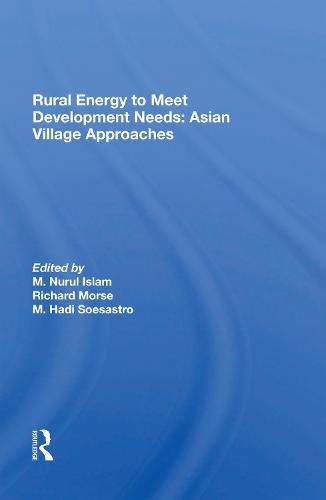Readings Newsletter
Become a Readings Member to make your shopping experience even easier.
Sign in or sign up for free!
You’re not far away from qualifying for FREE standard shipping within Australia
You’ve qualified for FREE standard shipping within Australia
The cart is loading…






This book integrates policy, technology, and action research methods in providing new perspectives and tools for Asian village decision makers and planners who seek more effective uses of energy in important rural tasks. The cooperative research on which the book is based was motivated by two policy concerns: the supply instability and price uncertainty of petroleum-based fuels, fertilizers, and pesticides; and the environmental depletion associated with widespread dependency on firewood and farm residues for cooking fuel. The authors combine the voices and knowledge of women and men who produce and use rural energy with analyses and assessments by engineers, economists, agricultural scientists, and anthropologists to clarify these issues while filling serious information gaps about the use and substitution of fossil and biomass fuels.
The book focuses initially on cooking fuel required to meet food and nutrition needs. It demonstrates research methods linking energy with farming systems to increase agricultural productivity and to support other income- and employment-generating activities in rural areas. The authors thereby establish a research agenda through which rural residents, interacting with specialists and policymakers, can build upon their own experience and values in organizing socially and environmentally appropriate rural energy systems.
$9.00 standard shipping within Australia
FREE standard shipping within Australia for orders over $100.00
Express & International shipping calculated at checkout
This book integrates policy, technology, and action research methods in providing new perspectives and tools for Asian village decision makers and planners who seek more effective uses of energy in important rural tasks. The cooperative research on which the book is based was motivated by two policy concerns: the supply instability and price uncertainty of petroleum-based fuels, fertilizers, and pesticides; and the environmental depletion associated with widespread dependency on firewood and farm residues for cooking fuel. The authors combine the voices and knowledge of women and men who produce and use rural energy with analyses and assessments by engineers, economists, agricultural scientists, and anthropologists to clarify these issues while filling serious information gaps about the use and substitution of fossil and biomass fuels.
The book focuses initially on cooking fuel required to meet food and nutrition needs. It demonstrates research methods linking energy with farming systems to increase agricultural productivity and to support other income- and employment-generating activities in rural areas. The authors thereby establish a research agenda through which rural residents, interacting with specialists and policymakers, can build upon their own experience and values in organizing socially and environmentally appropriate rural energy systems.